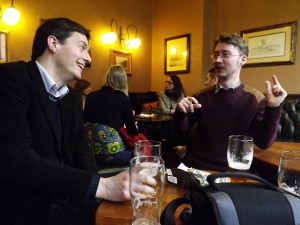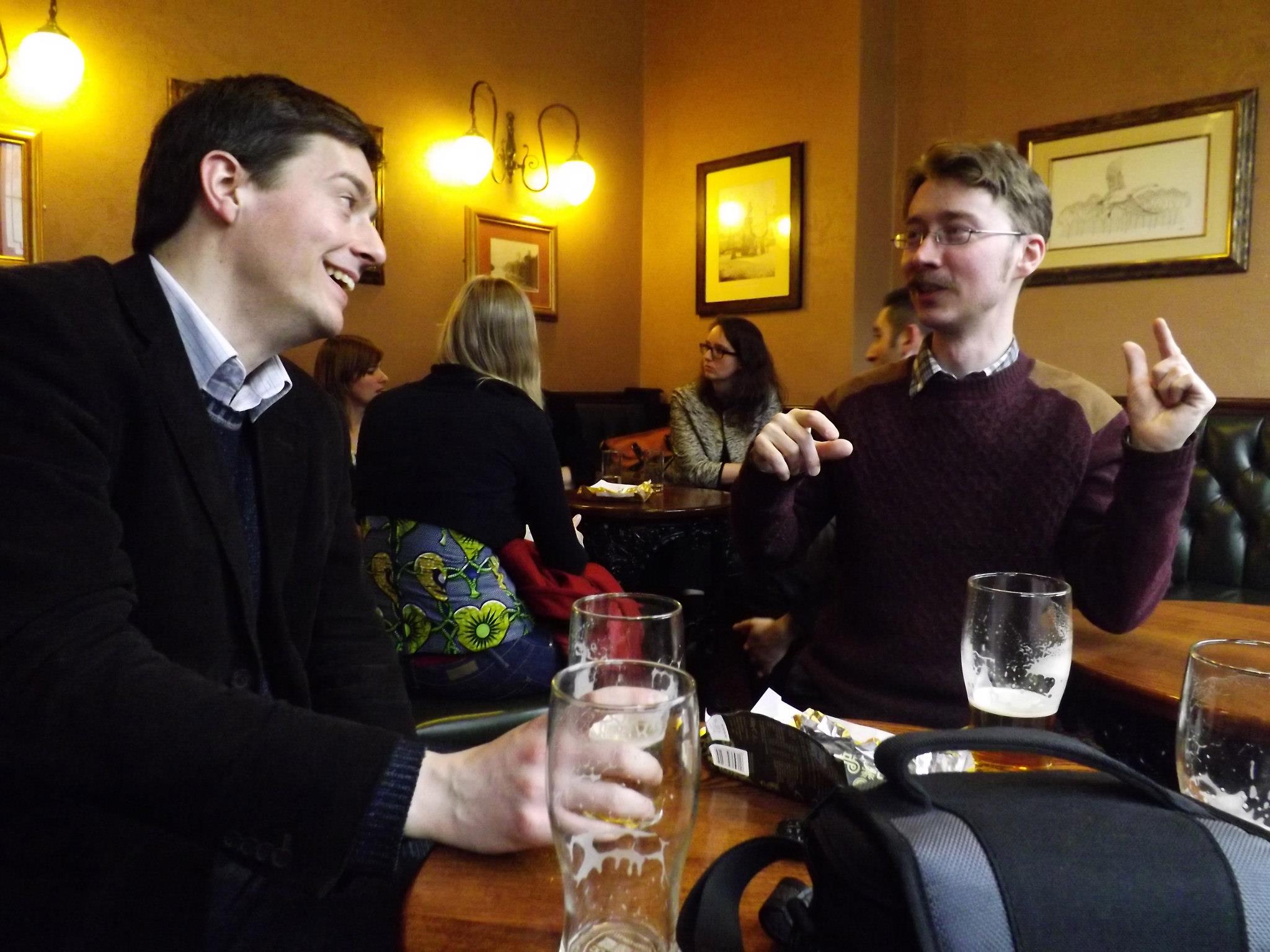Unless you have had your head buried in the sand for the past decade or so, if you are involved in the academic study of ‘religion’ you will have come across the field of ‘Material Religion’. People have Leading international Religious Studies podcasts have focused on it. And the BSA Sociology of Religion Study Group made it the focus of their annual conference at Durham University, UK, in April of this year.

However, what exactly does Material Religion bring to Religious Studies? Is it a potentially revolutionary phenomenon, or merely a passing fad? How might one apply the theoretical perspectives and methodologies developed in this growing field to some of the defining debates of our subject area? To discuss these issues, and reflect on the conference in general, RSP hosts David Robertson and Christopher Cotter were joined by George Ioannides, Rachel Hanneman and Dr David Wilson (and some local regulars in the background) in the Swan and Three Cygnets pub in Durham, immediately after the conference finished. This week’s podcast is a recording of their discussion.
Podcast: Play in new window | Download | Embed
Subscribe: RSS
You can also download this roundtable, and subscribe to receive our weekly podcast, on Material Religion with David Morgan, Religion, Space and Locality with Kim Knott, and Religion and the Built Environment with Peter Collins.
Meet the Discussants:
 Christopher R. Cotter is a PhD Candidate at Lancaster University, UK. His thesis, under the supervision of Professor Kim Knott, focuses upon the lived relationships between the concepts of ‘religion’, ‘nonreligion’, and the ‘secular’, and their theoretical implications for Religious Studies. In 2011, he completed his MSc by Research in Religious Studies at the University of Edinburgh, on the topic ‘Toward a Typology of Nonreligion: A Qualitative Analysis of Everyday Narratives of Scottish University Students’. Chris has published on contemporary atheism in the International Journal for the Study of New Religions, is Editor and Bibliography Manager at the Nonreligion and Secularity Research Network, and co-editor (with Abby Day and Giselle Vincett) of the volume Social Identities between the Sacred and the Secular (Ashgate, 2013). See his personal blog, or academia.edu page for a full CV.
Christopher R. Cotter is a PhD Candidate at Lancaster University, UK. His thesis, under the supervision of Professor Kim Knott, focuses upon the lived relationships between the concepts of ‘religion’, ‘nonreligion’, and the ‘secular’, and their theoretical implications for Religious Studies. In 2011, he completed his MSc by Research in Religious Studies at the University of Edinburgh, on the topic ‘Toward a Typology of Nonreligion: A Qualitative Analysis of Everyday Narratives of Scottish University Students’. Chris has published on contemporary atheism in the International Journal for the Study of New Religions, is Editor and Bibliography Manager at the Nonreligion and Secularity Research Network, and co-editor (with Abby Day and Giselle Vincett) of the volume Social Identities between the Sacred and the Secular (Ashgate, 2013). See his personal blog, or academia.edu page for a full CV.
Rachel Hanemann is working on her PhD at the University of Kent in Canterbury. Her research examines the role of the body in processes of religious formation and as a managed site of identity at an all-girls Catholic secondary school in London. She feels that this biographical note thoroughly encapsulates her as a person. Chris forgot to ask her for a picture to use on this page. He apologises profusely and is wearing the cone of shame.
 George Ioannides studied comparative religion as part of his Undergraduate degree at the University of Sydney, Australia.
George Ioannides studied comparative religion as part of his Undergraduate degree at the University of Sydney, Australia.
 David G. Robertson is a Ph.D. candidate in the Religious Studies department of the University of Edinburgh. His research examines how UFO narratives became the bridge by which ideas crossed between the conspiracist and New Age milieus in the post-Cold War period. More broadly, his work concerns contemporary alternative spiritualities, and their relationship with popular culture. Publications include “Making the Donkey Visible: Discordianism in the Works of Robert Anton Wilson” in C. Cusack & A. Norman (Eds.), Brill Handbook of New Religions and Cultural Production. Leiden: Brill (2012) and “(Always) Living in the End Times: The “rolling prophecy” of the conspracist milieu” in When Prophecy Persists. London: INFORM/Ashgate (2012). For a full CV and my MSc thesis on contemporary gnosticism, see my Academia page or my personal blog.
David G. Robertson is a Ph.D. candidate in the Religious Studies department of the University of Edinburgh. His research examines how UFO narratives became the bridge by which ideas crossed between the conspiracist and New Age milieus in the post-Cold War period. More broadly, his work concerns contemporary alternative spiritualities, and their relationship with popular culture. Publications include “Making the Donkey Visible: Discordianism in the Works of Robert Anton Wilson” in C. Cusack & A. Norman (Eds.), Brill Handbook of New Religions and Cultural Production. Leiden: Brill (2012) and “(Always) Living in the End Times: The “rolling prophecy” of the conspracist milieu” in When Prophecy Persists. London: INFORM/Ashgate (2012). For a full CV and my MSc thesis on contemporary gnosticism, see my Academia page or my personal blog.
 David Gordon Wilson wears many hats. He served as a solicitor, then partner, then managing partner in Scotland, the United Arab Emirates, Oman, and Egypt, before returning to university to embark on a Religious Studies degree. His PhD at the University of Edinburgh focused upon spiritualist mediumship as a contemporary form of shamanism, and his monograph has recently been published with Bloomsbury, titled Redefining Shamanisms: Spiritualist Mediums and Other Traditional Shamans as Apprenticeship Outcomes. Wearing one of his other hats, David is a practising spiritualist medium and healer, and among his many connected roles, he is currently the President of the Scottish Association of Spiritual Healers.
David Gordon Wilson wears many hats. He served as a solicitor, then partner, then managing partner in Scotland, the United Arab Emirates, Oman, and Egypt, before returning to university to embark on a Religious Studies degree. His PhD at the University of Edinburgh focused upon spiritualist mediumship as a contemporary form of shamanism, and his monograph has recently been published with Bloomsbury, titled Redefining Shamanisms: Spiritualist Mediums and Other Traditional Shamans as Apprenticeship Outcomes. Wearing one of his other hats, David is a practising spiritualist medium and healer, and among his many connected roles, he is currently the President of the Scottish Association of Spiritual Healers.









